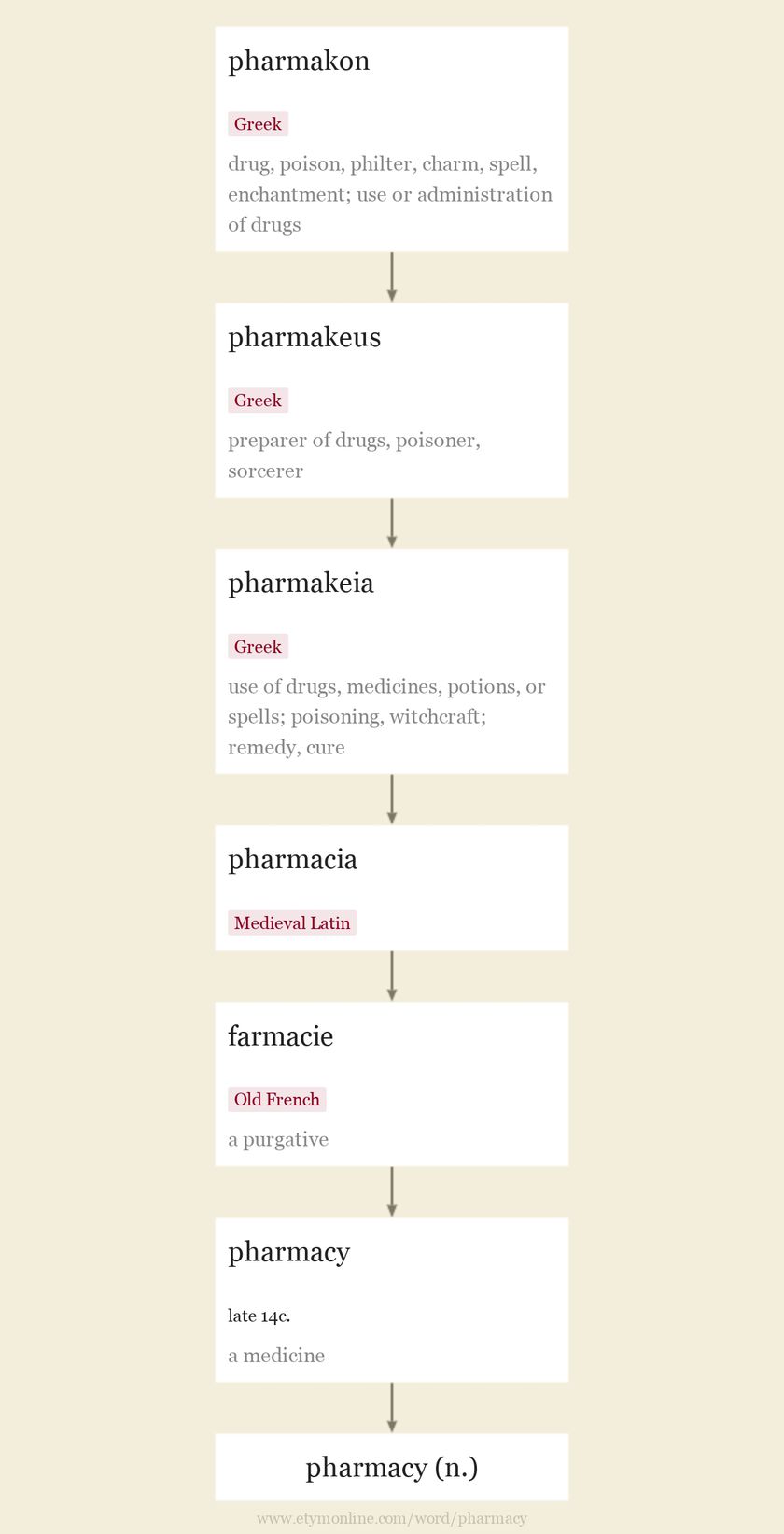
Etymology of Pharmacy
pharmacy (n.)
late 14c., farmacie, “a medicine that rids the body of an excess of humors (except blood);” also “treatment with medicine; theory of treatment with medicine,” from Old French farmacie “a purgative” (13c.) and directly from Medieval Latin pharmacia, from Greek pharmakeia “a healing or harmful medicine, a healing or poisonous herb; a drug, poisonous potion; magic (potion), dye, raw material for physical or chemical processing.”
This is from pharmakeus (fem. pharmakis) “a preparer of drugs, a poisoner, a sorcerer” from pharmakon “a drug, a poison, philter, charm, spell, enchantment.” Beekes writes that the original meaning cannot be clearly established, and “The word is clearly Pre-Greek.” The ph- was restored 16c. in French, 17c. in English (see ph).
Buck [“Selected Indo-European Synonyms”] notes that “Words for ‘poison’, apart from an inherited group, are in some cases the same as those for ‘drug’ ….” In addition to the Greek word he has Latin venenum “poison,” earlier “drug, medical potion” (source of Spanish veneno, French venin, English venom), and Old English lybb.
Meaning “the use or administration of drugs” is from c. 1400; the sense of “art or practice of preparing, preserving, and compounding medicines and dispensing them according to prescriptions” is from 1650s; that of “place where drugs are prepared and dispensed” is recorded by 1833.

Entries linking to pharmacy
pH 1909, from German PH, introduced by S.P.L. Sörensen, from P, for German Potenz “potency, power” + H, symbol for the hydrogen ion that determines acidity or alkalinity.
venom (n.)mid-13c., venim, venym, “poison secreted by some animals and transferred by biting,” from Anglo-French and Old French venim, venin “poison; malice,” from Vulgar Latin *venimen (source also of Italian veleno, Spanish veneno), from Latin venenum “poison,” earlier (pre-classical) “drug, medical potion,” also “charm, seduction,” probably originally “love potion,” from PIE *wenes-no-, from root *wen- (1) “to desire, strive for.” Variously deformed in post-Latin languages, apparently by dissimilation. Modern spelling in English from late 14c. The meaning “bitter, virulent feeling or language” is first recorded c. 1300.
Harper, D. (n.d.). Etymology of pharmacy. Online Etymology Dictionary. Retrieved August 21, 2022, from https://www.etymonline.com/word/pharmacy
Etymology at Wikipedia
The word pharmacy is derived from Old French farmacie “substance, such as a food or in the form of a medicine which has a laxative effect” from Medieval Latin pharmacia from Greek pharmakeia (Greek: φαρμακεία) “a medicine”, which itself derives from pharmakon (φάρμακον), meaning “drug, poison, spell“[“pharmacy | Origin and meaning of pharmacy by Online Etymology Dictionary”. www.etymonline.com. Archived from the original on 6 September 2019. Retrieved 6 September 2019][ φάρμακον. Liddell, Henry George; Scott, Robert; A Greek–English Lexicon at the Perseus Project.][“PY 1314 Vn + frr. (Cii)”. DĀMOS: Database of Mycenaean at Oslo. University of Oslo. Archived from the original on 16 March 2014. Retrieved 16 March 2014.Raymoure, K.A. “pe-re”. Minoan Linear A & Mycenaean Linear B. Deaditerranean. Archived from the original on 12 October 2013. Retrieved 16 March 2014.“The Linear B word pa-ma-ko”. Palaeolexicon. Word study tool of ancient languages. Archived from the original on 16 March 2014. Retrieved 16 March 2014. Its earliest attested form in Greek could be the Mycenaean 𐀞𐀔𐀒, pa-ma-ko, written in the Linear B syllabic script and found on the PY Un 1314 tablet; this tablet is also found listed as PY Vn 1314 or PY Sb 1314] (which is etymologically related to pharmakos. A pharmakós (Greek: φαρμακός, plural pharmakoi) in Ancient Greek religion was the ritualistic sacrifice or exile of a human scapegoat or victim).


Leave a Reply